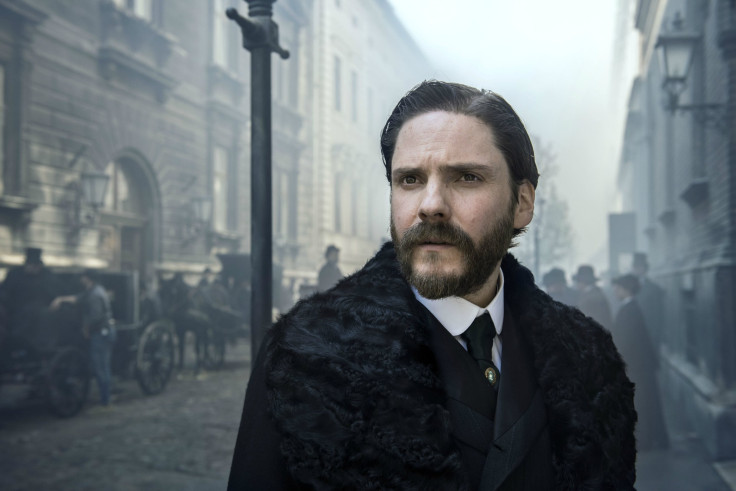The Alienist premiere “The Boy on the Bridge” opens on a familiar scene, as a cop walking the beat comes across a dead body, but his response is novel. There’s no whistle, no calling it in on the radio. Instead, he rushes to the nearest elevated train stanchion and beats on it with his billy club. Other cops join in down track, until the entire neighborhood is reverberating and the message gets through to whatever police station for which it was intended. Familiar scene, unexpected historical detail — that’s The Alienist.
The boy of the title is a 13-year-old prostitute, dressed as a girl and presumably lured away from one of the several brothels on the Bowery. Discovered horrifically mutilated atop a half-constructed metal walkway, the boy is destined to be ignored by police, who are both disgusted by homosexuality and paid by the gangsters who own the brothels to look the other way. But the corrupt police department didn’t count on new commissioner Theodore Roosevelt or Dr. Lazlo Kreizler, the famous alienist (the 19th century name for experts in mental illness).
“The Boy on the Bridge,” like most premieres, is all about introductions. In quick succession we meet the three leads. Daniel Brühl (Inglourious Basterds, Captain America: Civil War) plays Dr. Kreizler with a formless, whispery intensity that might be interesting should the events of the series push his mind elsewhere. Luke Evans (Fast & Furious 6, High-Rise) is newspaper illustrator John Moore, who’s mainly around to be bewildered and shocked by both the violence of the urban underbelly (like Kreizler, Moore is from the upper crust) and Dr. Kreizler’s detachment: Bones to Kreizler’s Spock. And then there’s Dakota Fanning as Sara Howard, Commissioner Roosevelt’s secretary, who teams up with Kreizler to find meaningful work apart from the sexism and corruption of the thuggish beat cops she works with day-to-day.

Together they’re after a serial killer targeting young boys, most prostitutes, though Dr. Kreizler suspects one of his former patients — brought to him because the boy’s parents hoped to cure his apparent homosexuality — was also a victim of the same killer. It’s easy to see in The Alienist echoes of both modern serial killer stories and Jack the Ripper-type tales set in the same late 19th century milieu. Silence of the Lambs, Seven, Alan Moore’s comic From Hell, Manhunter, Dexter, Mindhunter, Zodiac, The Fall and countless true crime documentaries, podcasts and books make this a genre without much wiggle room. And there’s nothing quite like the gastro-cultural aesthetic or homosexual undertones of Hannibal, which uses the serial killer more as a metaphor than a real-life entity, to separate The Alienist from that pack.
It’s just the first episode, so this could easily change, but The Alienist feels very conventional at the start, right down to Kreizler’s episode-ending monologue, announcing his determination to see inside the killer’s mind:
“His acts are so wretched, so evil, that only if I become him, if I cut the child’s throat myself, if I run my knife through the helpless body and pluck innocent eyes from a horrified face, only then will I truly understand what I am… I must see life as he sees it.”
Still, if The Alienist kicks off a conventional story, the premiere announces just how boldly they’ll tell it. Movie-caliber production design is less of a novelty these days, but still, The Alienist is often breathtaking. As well-detailed, but less colorful than Gangs of New York, the oppressive Lower East Side of the late 19th century is captured in both its wretched poverty and excesses. The Alienist premiere is most fun as a whirlwind tour of Victorian-era America, from the gigantic shoulders on Sara Howard’s dress to the repulsive dungeons of the insane asylum where the police find syphilitic indigents to pin murders on. Just as Caleb Carr’s source novel was known for its attention to historic detail, the TV adaptation is often best when it’s capturing the little idiosyncrasies of its moment, such as Moore’s peculiar habit of insisting prostitutes put on a wedding ring when he’s with them in private.
Restrained and conventional from the start, The Alienist premiere episode is nevertheless a rich, textured experience and polished production. If subsequent episodes can diverge from expected serial killer tropes and inject a little mania into its subdued but capable cast, The Alienist might just deliver on the promise apparent in “The Boy on the Bridge.”
The Alienist premieres Jan. 22 at 9 p.m. on TNT.


















